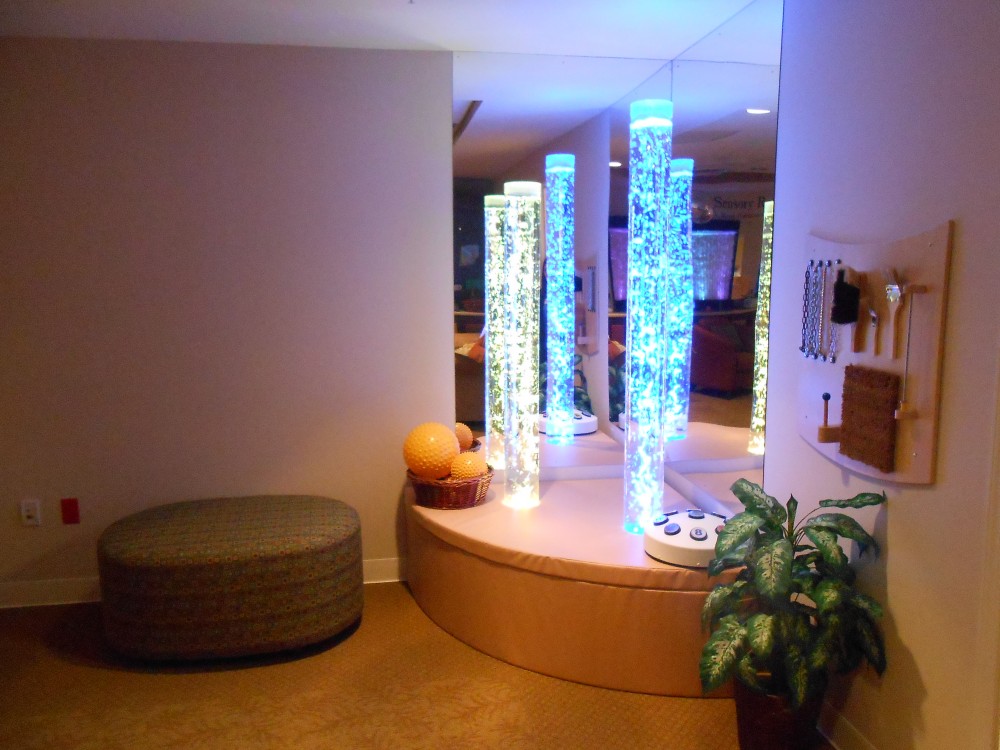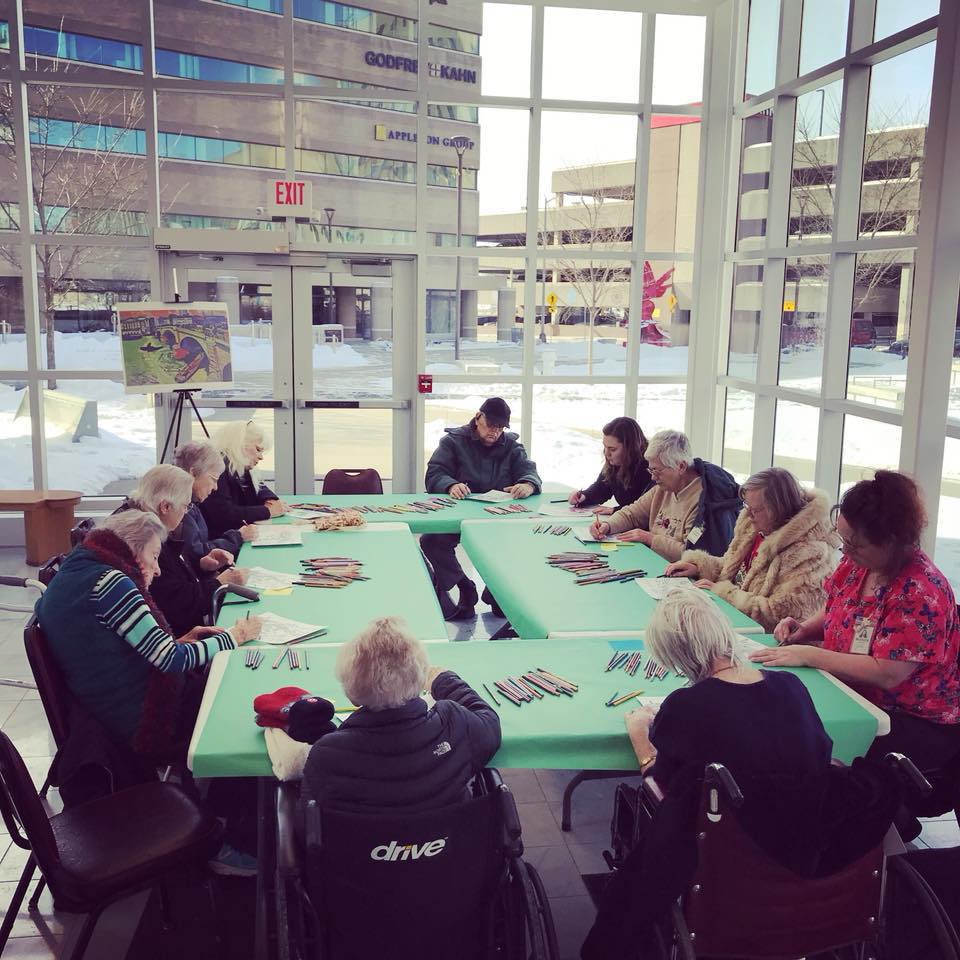Learning Every Day
Creative memory loss therapies focus on mental stimulation, social engagement and artistic pursuits
The Alzheimer’s Association reports that as of 2017, approximately 110,000 Wisconsin residents aged 65 and older have been diagnosed with Alzheimer’s Disease. For perspective, if everyone with Alzheimer’s lived in the same community, they’d make up more than half the Fox Cities, and that number is always on the rise.
Over decades, Alzheimer’s Disease destroys nerve cells in the brain which then causes dementia, a set of symptoms that include memory loss and impairment to reasoning skills.
While there is no present cure for Alzheimer’s or dementia, many personalized memory loss therapies in the Fox Valley confront the disease by emphasizing social engagement, physical activity, relaxation, art and accessing memories, even if temporarily. These local programs improve the quality of life for people with memory loss and their loved ones.
The Fox Valley Memory Project was founded in 2013 with the goal of finding solutions for memory loss in the community. One way this is accomplished is through the Memory Cafe, monthly or semimonthly social events hosted at 10 Fox Cities locations. No two events are the same – this month, the events range from a poetry reading at Kimberly’s Municipal Complex to a commemoration of spring at Mosquito Hill Nature Center in New London.
Lynn Ann Clausing Rusch, program coordinator at Fox Valley Memory Project, says the Memory Cafe is a huge community effort, with nine locations facilitated entirely by volunteers.
“The Memory Cafe is an opportunity to go somewhere where everybody understands dementia,” says Clausing Rusch. “We all understand dementia is tough and sometimes it’s hard to go out in public and many people lose their friends and social connections, so it’s a judgment-free way to get a social life.”
While Memory Cafe encompass a variety of programming and events, others have a more specific approach. Valley VNA Senior Care’s Lyrics and Laughter program, based in Neenah, focuses entirely on music therapy.
The six-week program is an opportunity for people with memory loss to socially engage in a group by singing and dancing. According to Carrie Esselman, manager of life enrichment at Valley VNA, the more recognizable songs, like classic rock and roll and patriotic tunes, are most likely to prompt singing along and sharing memories.
“A lot of times, memories do come about from those songs,” Esselman says. “We do have kind of a theme of music and memories, where we’re going to listen to a song, and I want you to share the memories you have with a song because they’ll take them back to a time. And in their community session where they usually have a daughter or a husband or a wife with them or a close family member, and they’re like, ‘Wow, I’ve never that story from Mom or Dad before.’”
Esselman says the goal is getting participants engaged, whether that’s through actively singing and dancing or more subtly responding to the music by tapping to the beat. Lyrics and Laughter is held weekly because Esselman says participants become more engaged over time.
“[One woman] has more early-onset dementia,” Esselman says. “We just held the fifth Lyrics and Laughter session and finally she didn’t cry throughout. She didn’t want to leave throughout, she smiled [and] held hands with everyone throughout, and at the end, it was love songs, and she had just lost her husband, … but she started talking about her husband, and it was happy thoughts with memories about their wedding day.”
In other cases, the therapy process is less direct and more individualized. Felician Village in Manitowoc has two Snoezelen “sensory rooms,” which are filled with stimulus-boosting items like a bubble tank that whirrs and changes colors, relaxing music and videos, aromatherapy and weighted, textured objects to feel.
 Connie Thimmig, director of enrichment services at Felician Village, says each person responds to different types of stimulation.
Connie Thimmig, director of enrichment services at Felician Village, says each person responds to different types of stimulation.
“The key to this room is to know the resident,” Thimmig says. “[The benefit] of being here is the quietness of the room and really just connecting on a different level. [Outside], there’s just so much going on, there’s so much stimulation in groups. Our purpose is to make them relax.”
The sensory room environment makes it much easier for people with dementia to communicate without distraction. Thimmig says it’s great for connecting couples where one partner has dementia and the other doesn’t.
One of the best ways to keep the mind stimulated is through creative projects and art. The Spark! program engages participants in lively discussions, art making and multisensory activities. Appleton’s Trout Museum of Art is among the Wisconsin museums awarded funding by Bader Philanthropies to create Spark! programming in the form of semimonthly group painting activities. Touchmark Retirement Community in Appleton hosts Fragrance in Frames semimonthly, combining aromatherapy and art therapy by mixing paint and essential oils.
 “They test the individual fragrances with residents to make sure it is a pleasant fragrance for them, that it’ll elicit good memories, prompt conversation,” says Barbara Pandolfo, Touchmark Appleton’s executive director. “We’re invoking memories and recall, stories and creativity.”
“They test the individual fragrances with residents to make sure it is a pleasant fragrance for them, that it’ll elicit good memories, prompt conversation,” says Barbara Pandolfo, Touchmark Appleton’s executive director. “We’re invoking memories and recall, stories and creativity.”
The painting process is packed with complex mental stimulations: choosing colors, the tactile process of putting paint to paper, deciding what to paint and describing the finished product all contribute to keeping the mind active, Pandolfo indicates.
“When we get started, [residents] write their names in a signature,” Pandolfo says. “In some cases, it’s a bit illegible. In [other] cases, they don’t know how to spell their name anymore. After the painting is done, they ask the resident to sign their name again, and we’ve seen some pretty astonishing differences.”
Memory loss therapies not only enrich the lives of those with memory loss, but they benefit their loved ones as well.
“After the [Spark!] program was over,” says Pamela Williams-Lime, president of the Trout Museum of Art, “a woman said to me, … ‘my husband hasn’t spoken in over three months. Twenty minutes into your program, he started talking.’ I was floored. I almost started crying when she said that to me.”
Thimmig believes these short-term therapies should be better supplemented with long-term research, considering that if a cure isn’t found, the Alzheimer’s Association reports the yearly cost of Alzheimer’s care will quadruple to $1.1 trillion per year by 2050.
“Until our government allocates more money to this disease, we’ll never find a cure,” Thimmig says.
Fortunately, community support helps sustain many of the therapy programs in the Fox Cities.
“People in our community, both corporate granters and individual sponsors, really recognize that there is a need for our program, and they have been pretty generous in helping support the program,” Williams-Lime says.
Before a cure is found, Thimmig says the best and only way to prevent dementia is to keep the mind active as early as possible.
“You can exercise, avoid smoking, [eat] properly, get enough sleep,” Thimmig says. “Learning is important, because you’re making new connections in your brain.”
Dementia or not, Pandolfo says it’s never too late to learn.
“If something’s new, new learning’s great,” Pandolfo says. “This is about engaging. Any methodology that engages somebody and … keeps them independent as best possible, active and participating in life is a success.”
Award-Winning Care
St. Paul Elder Services in Kaukauna recently received the Excellence in Dementia Care Award, a national recognition from LeadingAge and Integrace, for their innovative Passages program. Passages encompasses St. Paul’s portfolio of memory care services which support people living with dementia and their loved ones at each stage in the progression of the disease. The program includes a variety of living options and memory care-specific services including support groups, education sessions and adult day services. The Hoffman Memory Care Resource Center, which houses the Passages programs, features a reference library and dementia-friendly fitness center. Sondra Norder, president and CEO of St. Paul Elder Services, says the organization’s care philosophy is person-centered. “We get to know the person, what their life history was and what they enjoyed doing so we can engage and reminisce with them, and provide opportunities to have meaningful experiences in the community,” she says. St. Paul Elder Services was honored on March 19 at the 5th annual Great Minds Gala in Washington D.C.












Leave a Comment